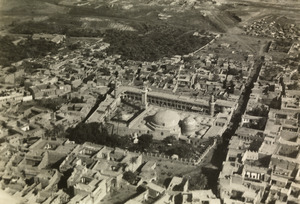Abdul Qadir Gilani facts for kids
Quick facts for kids Abdul Qadir Gilani |
|
|---|---|
 |
|
| Religion | Islam |
| Denomination | Sunni |
| Personal | |
| Born | March 23, 1078 CE (1 Ramadan, 470 AH) Gilan, Seljuk Empire |
| Died | February 21, 1166 CE (11 Rabi' al-Thani, 561 AH) (aged 87). Baghdad, Abbasid Caliphate |
| Resting place | Baghdad, Iraq |
| Children | Abdul Razzaq Gilani |
| Senior posting | |
| Title | Shaykh al-Islam |
| Influenced | Abdul Razzaq Gilani, Mu'in al-Din Chishti, Shihab al-Din 'Umar al-Suhrawardi, Sayyid Mir Jan, Al-Nawawi, Salah al-Din al-Ayyubi, Madar Ahmed Shirwac, Uways al-Barawi, Abadir Umar ar-Rida, Al-Zaylaʽi |
Abdul Qadir Gilani was a very important Muslim scholar and spiritual leader. He lived a long time ago, during a period known as the Islamic Golden Age. He is famous for starting a special group within Sufism called the Qadiriyya order.
He was a Sunni Muslim from the Hanbali school of thought. People admired him as a preacher, a mystic, and a jurist (someone who studies law). He was born on March 23, 1078 CE, in a town called Na'if in Gilan, which is in modern-day Iran. He passed away in Baghdad on February 21, 1166 CE, at the age of 87.
Contents
What's in a Name?
Abdul Qadir Gilani had several names and titles. His honorific Muhiyudin means "reviver of religion." This shows how much Sufi followers respected him.
The name Gilani (or al-Jilani) tells us where he was born, in the Gilan province. He was also known as Baghdadi because he lived and was buried in Baghdad.
His Family Background
Abdul Qadir Gilani came from a respected family. His father, Abu Saleh, was a descendant of Hasan ibn Ali. Hasan was a grandson of the Islamic prophet Muhammad.
People in his time considered Abu Saleh a saint. He was also known as Jangi Dost, which means "fight-lover" in Persian. Gilani's mother, Ummul Khair Fatima, also came from a noble lineage. She was a descendant of Husayn ibn Ali, who was Hasan's younger brother.
His Education and Learning
Gilani spent his early years in his home province of Gilan. When he was eighteen, in 1095, he traveled to Baghdad. Baghdad was a major center for learning at that time.
In Baghdad, he studied Hanbali law with important teachers like Abu Saeed Mubarak Makhzoomi. He also learned about Hadith, which are sayings and actions of Prophet Muhammad. His spiritual guide in Sufism was Abu'l-Khair Hammad ibn Muslim al-Dabbas. After finishing his studies, Gilani spent 25 years traveling through the deserts of Iraq.
His Legal Teachings
Al-Jilani was skilled in two major schools of Islamic law: the Shafi'i and the Hanbali schools. He taught both of them equally. He would even give legal opinions (called fatwa) using principles from both schools at the same time.
A famous scholar named al-Nawawi praised him for this. He said that no one was more respected than Sheikh Muhyi al-Din 'Abd al-Qadir al-Jilani in Baghdad. He was known as the Sheikh for both Shafi'is and Hanbalis.
Later Life and Preaching
In 1127, Gilani returned to Baghdad. He started teaching and preaching to the public. He joined the teaching staff at the school of his former teacher, al-Mazkhzoomi. Students really liked his lessons.
In the mornings, he taught about hadith and tafsir (Quranic interpretation). In the afternoons, he talked about spiritual matters and the virtues of the Quran. He was a very convincing speaker. It is said that many Jews and Christians converted to Islam after hearing him. He was able to connect the spiritual side of Sufism with the rules of Islamic Law.
His Passing and Burial
Abdul Qadir Gilani passed away on February 21, 1166 CE. He was 87 years old. His body was laid to rest in a special shrine inside his school in Baghdad, Iraq. This shrine is located on the east bank of the Tigris River.
Over time, his shrine faced challenges. It was once destroyed during the rule of the Safavid Shah Ismail I. However, in 1535, the Ottoman Sultan Suleiman the Magnificent had a dome built over the shrine. This dome still stands today.
Celebrations and Anniversaries
Followers celebrate Abdul Qadir Gilani's birthday on 1 Ramadan. His death anniversary is on 11 Rabi' al-Thani. Some scholars suggest slightly different dates for these events.
In places like the Indian subcontinent, his death anniversary is a very special day. It is called Giyarwee Shareef, which means "Honoured Day."
His Books
Abdul Qadir Gilani wrote several important books. These books share his wisdom and teachings on Sufism and Islamic knowledge. Some of his well-known works include:
- Kitab Sirr al-Asrar wa Mazhar al-Anwar (The Book of the Secret of Secrets and the Manifestation of Light)
- Futuh al ghaib (Secrets of the Unseen)
- Ghunyat tut talibeen (Treasure for Seekers)
- Al-Fuyudat al-Rabbaniya (Emanations of Lordly Grace)
- Fifteen Letters: Khamsata 'Ashara Maktuban
- Fuyuz e Yazdani
- Kibriyat e Ahmar
- A Concise Description of Jannah & Jahannam
- The Sublime Revelation (al-Fatḥ Ar-rabbānī)
Images for kids
See also
 In Spanish: Abdul Qadir Gilani para niños
In Spanish: Abdul Qadir Gilani para niños
 | Janet Taylor Pickett |
 | Synthia Saint James |
 | Howardena Pindell |
 | Faith Ringgold |



